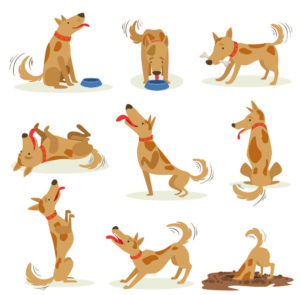Dog Training, Puppies Gear
How To Deal With Dog Behavior Problem?
Here are some ways on how to control your dog’s behavior
If you are new to dog ownership, you might misunderstand the common behaviors of your dog. Meanwhile, there could also be a possibility that you might assume that your dog is having a behavior problem. In order to prevent mishandling and misinterpreting our dogs, we should understand their common behaviors. Also, we should remember that obedience training for our dog is an essential part of dog ownership.

Here are the following common behaviors of dogs and how to control them if they’re getting out of hand:
Barking
In order to vocalize themselves, they bark, howl, whine and etc. However, if your dog is barking excessively, he/she might have a behavior problem. Meanwhile, here were the reasons why your dog is barking:
- Warning or alert
- Playfulness and excitement
- Attention-seeking
- Anxiety
- Boredom
- Responding to other dogs
To control the excessive barking of your dogs, teach him bark/quiet commands…
Chewing
Chewing is a very natural action for them. However, if your dog is chewing excessively, it might lead to behavior problem especially if your dog is making distractions.
Here the most common reasons why dogs chew:
- Puppy teething
- Boredom or excess energy
- Anxiety
- Curiosity (especially puppies)
Encourage your dog to chew on the right things by providing plenty of appropriate chew toys. Get a plush squeak toy here at https://puppiesgear.com/product/puppies-gear-plush-squeak-toy/ for your dog. When you are not home, keep your dog crated or confined to an area where less destruction can be caused.
Quickly discreact your dog with a sharp noise if you catch your dog chewing the wrong thing. Then, replace the item with a chew toy. One of the most important things you can do is to make sure your dog gets plenty of exercise so it can wear off energy and be stimulated in that way rather than turning to chew.
Digging
Digging is a common instinct for dogs especially if they were given a chance. Certain dog breeds, like terriers, are more prone to digging because of their hunting histories. In general, most dogs dig for these reasons:
- Boredom or excess energy
- Anxiety or fear
- Hunting instinct
- Comfort-seeking (such as nesting or cooling off)
- Desire to hide possessions (like bones or toys)
- To escape or gain access to an area
If digging seems inevitable, set aside an area where your dog can freely dig, like a sandbox. Train your dog that it is acceptable to dig in this area only.
Chasing
A dog’s desire to chase moving things is simply a display of predatory instinct. Many dogs will chase other animals, people, and cars. All of these can lead to dangerous and devastating outcomes. While you may not be able to stop your dog from trying to chase, you can take steps to prevent disaster.
- Keep your dog confined or on a leash at all times (unless directly supervised indoors).
- Train your dog to come when called.
- Have a dog whistle or noisemaker on hand to get your dog’s attention.
- Stay aware and watch for potential triggers, like joggers.
Your best chance at success is to keep the chase from getting out of control. To prevent this, get a dog harness here at https://puppiesgear.com/
Biting
Dogs bite and nip for several reasons, most of which are instinctive. Puppies bite and nip to explore the environment. Mother dogs teach their puppies not to bite too hard and discipline them when needed. This helps the puppies develop bite inhibition. Owners often need to show their puppies that mouthing and biting are not acceptable by continuing to teach bite inhibition.
Beyond puppy behavior, dogs may bite for several reasons. The motivation to bite or snap is not necessarily about aggression. A dog may snap, nip, or bite for a variety of reasons.
- Fear
- Defensiveness
- Protection of property
- Pain or sickness
- Predatory instinct
Any dog may bite if the circumstances warrant it in the dog’s mind. Owners and breeders are the ones who can help decrease the tendency for any type of dog to bite through proper training, socialization, and breeding practices.
Lastly, if you are suspecting that your dog is sick, call your vet immediately. For health-related questions, always consult your veterinarian, as they have examined your dog, know the dog’s health history, and can make the best recommendations for your dog.

